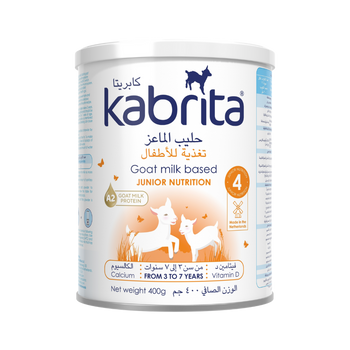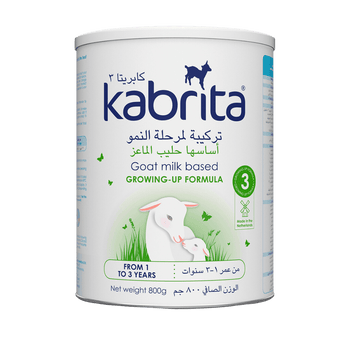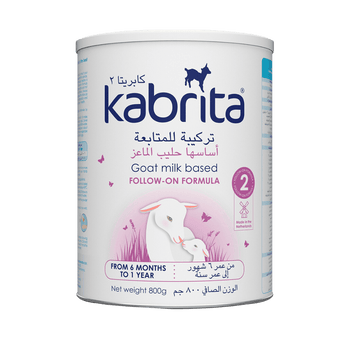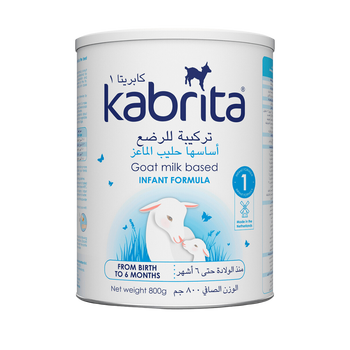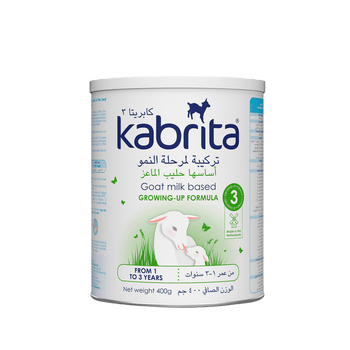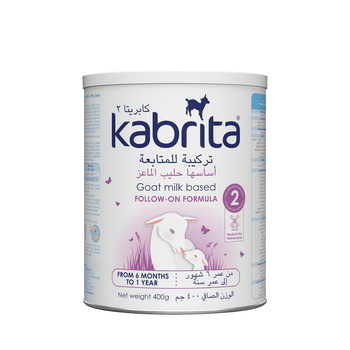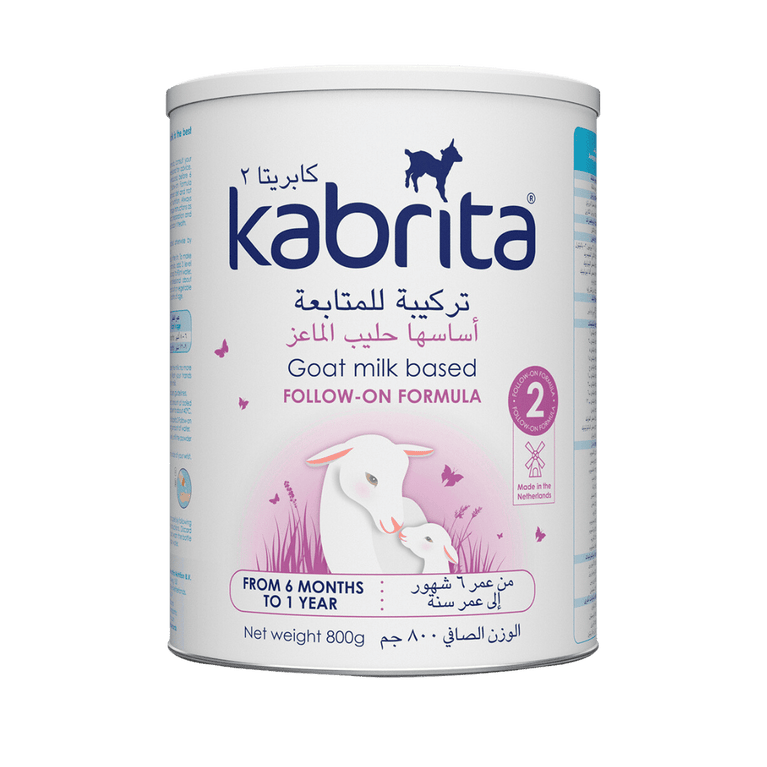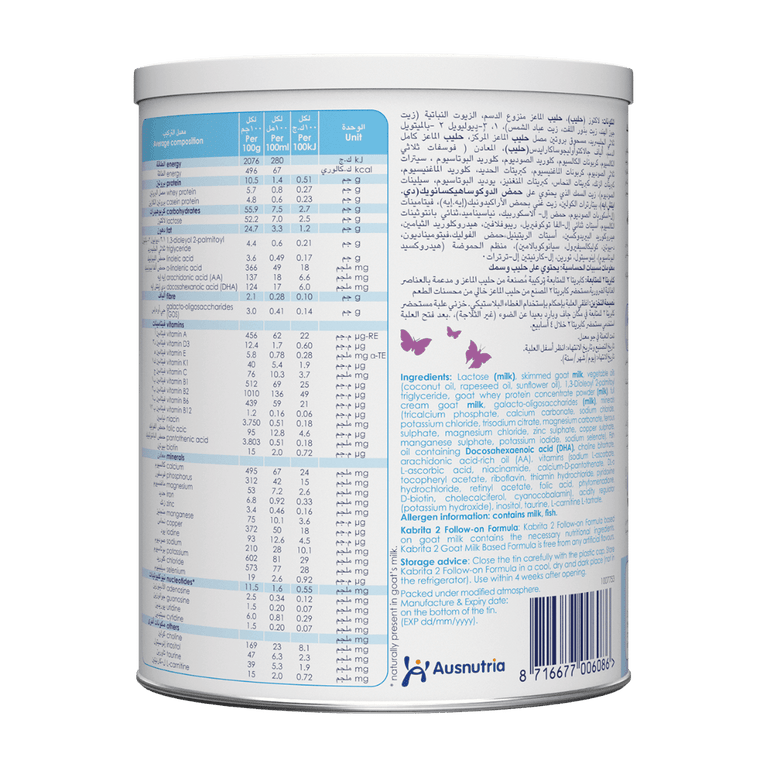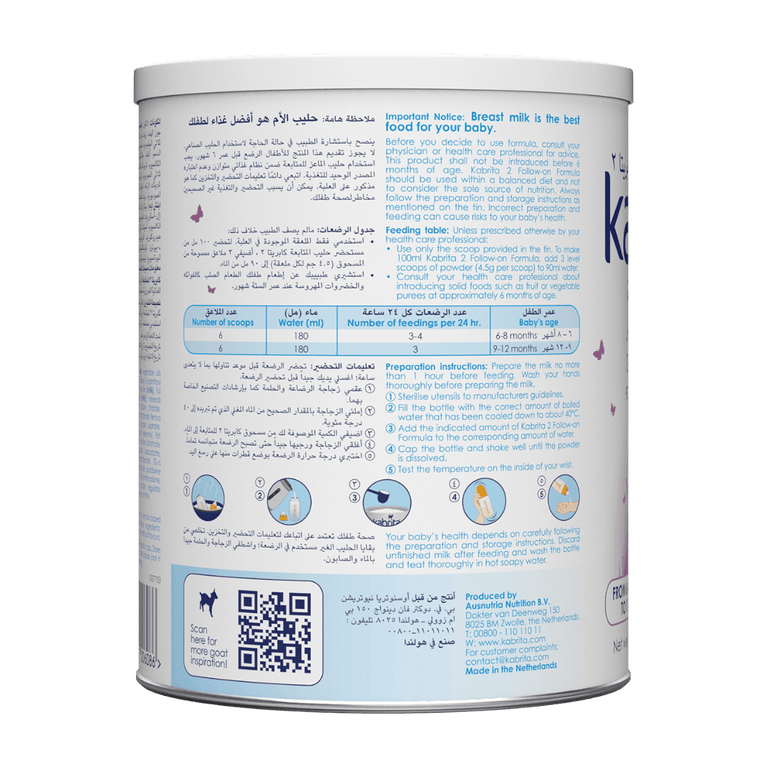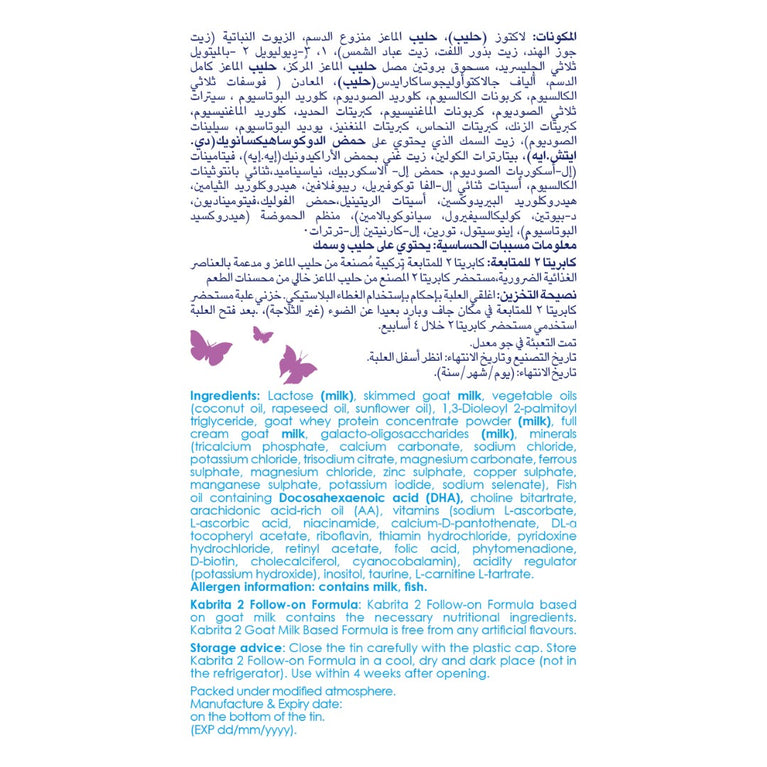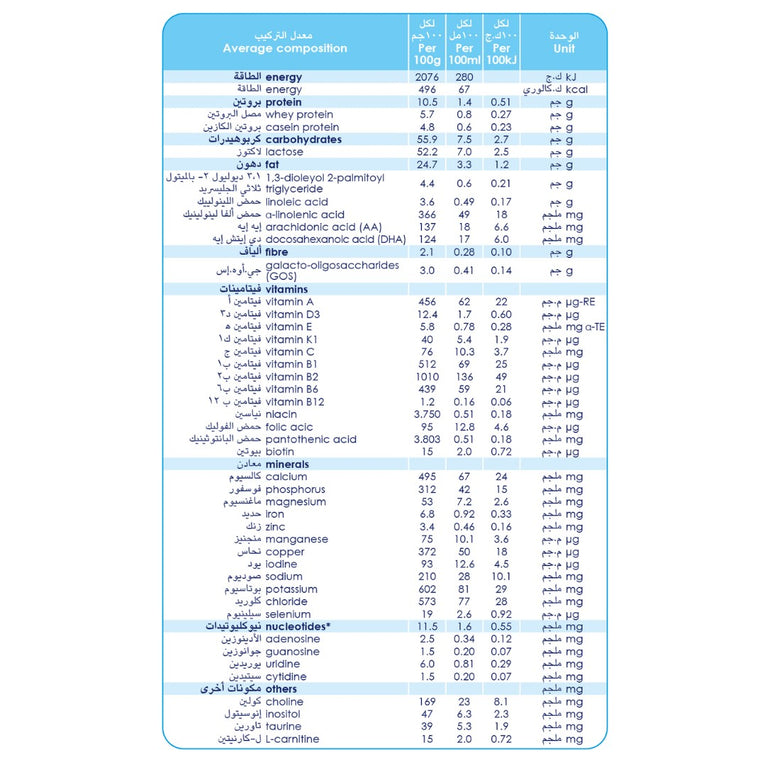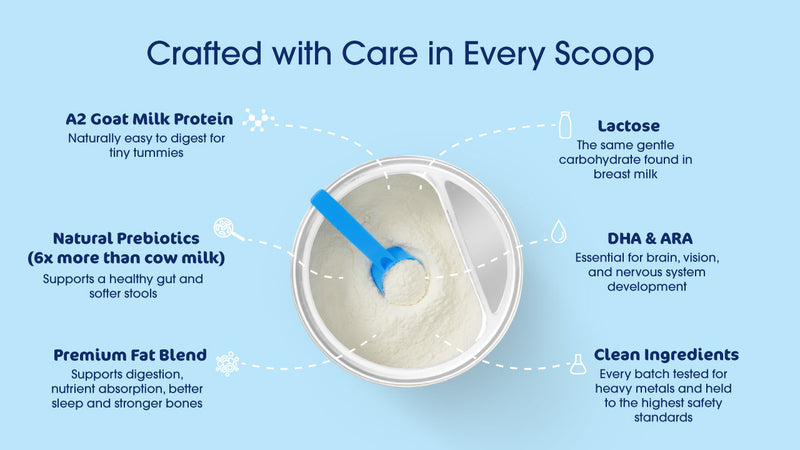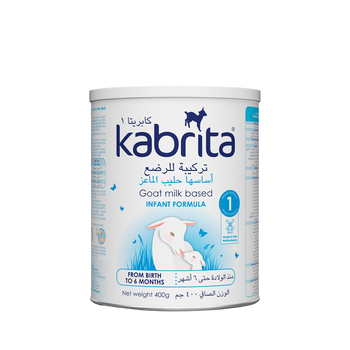Kabrita 2 Follow-up Milk 800 grams
- Regular price
- Dhs. 181.00
Breastfeeding is the most suitable feeding for your baby. Your babies health depends on carefully following the preparation and storage instructions. Before you decide to use Kabrita Follow-on formula, consult your health care professional for advice. Always follow the instructions on the tin, unless otherwise prescribed. Kabrita Follow-on formula is suitable starting at 6 months of age and is part of a balanced diet.
- Description
- Ingredients
- How to Prepare
- Nutritional Values
- FAQs
- Reviews
Important notice
Your baby's health depends on carefully following the preparation and storage instructions. Breastfeeding is the most suitable feeding for your baby. Kabrita 2 cannot be used in the first 6 months of age as a replacement for breastfeeding. Kabrita 2 is suitable starting at 6 months of age and is part of a balanced diet. Consult your health care professional for help with your baby's diet.
Feeding table
Unless prescribed otherwise by your health care professional:
- Use only the scoop provided in the tin. To make 100 ml Kabrita Follow-on formula: add 3 level scoops of powder (13.5 g) to 90 ml water.
- Consult your health care professional for help with your baby’s diet.
| Baby’s approx. age | No. of feeds per 24 hours | No. of level scoops | Water per feed (ml) |
| 6-8 months | 4 | 6 | 180 |
| 9-12 months | 3 | 6 | 180 |
- Based on Dutch goat milk
- Over 75 years of experience
- Worldwide No.1 in goat milk based bottle feeding
- Easy to digest
ingredients
Lactose (milk), skimmed goat milk, vegetable oils (coconut oil, rapeseed oil, sunflower oil), 1,3-dioleoyl-2-palmitoyl triglyceride, goat whey protein concentrate powder (milk), full cream goat milk, galacto-oligosaccharides (milk), minerals (tricalcium phosphate, calcium carbonate, sodium chloride, potassium chloride, magnesium carbonate, ferrous sulphate, magnesium chloride, zinc sulphate, copper sulphate, manganese sulphate, potassium iodide, sodium selenate), fish oil containing docosahexaenoic acid (DHA), choline bitartrate, arachidonic acid-rich oil (AA), vitamins (sodium L-ascorbate, L-ascorbic acid, DL-alpha tocopheryl acetate, niacinamide, calcium D-pantothenate, riboflavin, thiamin hydrochloride, retinyl acetate, pyridoxine hydrochloride, folic acid, phytomenadione, cholecalciferol, D-biotin, cyanocobalamin), inositol, taurine, L-carnitine, L-tartrate.
Preparation
Prepare the milk no more than 1 hour before feeding. Wash your hands thoroughly before preparing the milk.
- Sterilise utensils according to manufacturers guidelines.
- Fill the bottle with the correct amount of boiled water that has been cooled down for no more than 30 min.
- Add the indicated amount of Kabrita 2 to the corresponding amount of water.
- Cap the bottle and shake well until the powder is dissolved.
- Cool under running tap, and test the temperature on the inside of your wrist.

Your baby's health depends on carefully following the preparation and storage instructions. Discard unfinished milk after feeding and wash the bottle and teat thoroughly.
|
Nutrients
|
Per 100g |
Per 100ml
|
Unit
|
|
Energy
|
2076 |
280
|
Kilojoules
|
|
Energy
|
496 |
67
|
Calories
|
| Proteins | 10.5 | 1.4 | g |
| Whey Protein |
5.7 |
0.8 | g |
| Casein Protein |
4.8 |
0.6 | g |
| Carbohydrates | 55.9 | 7.5 | g |
| Lactose |
52.2 | 7.0 |
g |
|
Fats
|
24.7 |
3.3
|
g
|
| 1,3-Dioleyol 2-Palmitoyl Triglyceride |
4.4 |
0.6 | g |
|
Linoleic Acid
|
3.6 |
0.49
|
g
|
|
Alpha-linolenic acid
|
366 |
49
|
mg
|
|
Arachidonic Acid (AA)
|
137 |
18
|
mg
|
|
Docosahexaenoic Acid (DHA)
|
124 |
17
|
mg
|
| Fiber | 2.1 | 0.28 | g |
| GOS |
3.0 | 0.41 | g |
|
Vitamins
|
|
|
|
|
Vitamin A
|
456 |
62
|
IU
|
|
Vitamin D3
|
12.4 |
1.7
|
mcg
|
|
Vitamin E
|
5.8 |
0.78
|
IU
|
|
Vitamin K1
|
40 |
5.4
|
mcg
|
|
Vitamin C
|
76 |
10.3
|
mg
|
|
Vitamin B1
|
512 |
69
|
mcg
|
|
Vitamin B2
|
1010 |
136
|
mcg
|
|
Vitamin B6
|
439 |
59
|
mcg
|
|
Vitamin B12
|
1.2 |
0.16
|
mcg
|
|
Niacin
|
3.750 |
0.51
|
mcg
|
|
Folic Acid
|
95 |
12.8
|
mcg
|
|
Pantothenic Acid
|
3.803 |
0.51
|
mcg
|
|
Biotin
|
15.0 |
2.0
|
mcg
|
|
Minerals
|
|
|
|
|
Calcium
|
495 |
67
|
mg
|
|
Phosphorus
|
312 |
42
|
mg
|
|
Magnesium
|
53 |
7.2
|
mg
|
|
Iron
|
6.8 |
0.92
|
mg
|
|
Zinc
|
3.4 |
0.46
|
mg
|
|
Manganese
|
75 |
10.1
|
mcg
|
|
Copper
|
372 |
50
|
mcg
|
|
Iodine
|
93 |
12.6
|
mcg
|
|
Sodium
|
210 |
28
|
mg
|
|
Potassium
|
602 |
81
|
mg
|
|
Chloride
|
573 |
77
|
mg
|
|
Selenium
|
19 |
2.6
|
mcg
|
|
Other Nutrients
|
|||
|
Choline
|
169 |
23
|
mg
|
|
Inositol
|
47 |
6.3
|
mg
|
|
Taurine
|
39 |
5.3
|
mg
|
|
L-Carnitine
|
15 |
2.0
|
mg
|
Preparing your little one’s bottle is simple! Just follow these easy steps:
Wash your hands and sterilize the bottle.
Boil fresh water and let it cool to 40°C.
Pour the correct amount of water into the bottle.
Use the provided scoop to measure the formula (1 scoop per 30 ml of water).
Close the bottle, shake well, and test the temperature before feeding.
Tip: Always use the scoop that comes with the tin for the perfect measurement!
The number of feeds depends on your baby's weight. The recommended number of feeds per 24 hours is mentioned on the backside of the tin. If your baby requires more than the recommended number of feeds, we recommend consulting your pediatrician.
To prepare 100 ml of Kabrita formula:
Add 3 level scoops of powder to 90 ml of water. That means 1 scoop per 30 ml of water — easy to remember!
Always use the scoop provided in the tin to ensure accurate measurements.
Yes, you can — but with a few important guidelines!
We recommend using the prepared formula within 1 to 2 hours for the best quality and safety, as it may change in composition over time.
Here’s how to safely reheat your baby’s bottle:
Place the bottle in a bottle warmer or a bowl of warm water for a few minutes.
Avoid using the microwave, as it can cause uneven heating and create hot spots that might burn your baby.
Only reheat once. If your baby doesn't finish the bottle, it's best to prepare a fresh one next time.
Occasionally the scoop will settle in the powder. Try tilting the tin and tapping gently against the side to displace the powder. This should help you locate the scoop.
Once you open the tin, make sure to store it in a cool, dry place away from heat and humidity.
Use the formula within 4 weeks of opening to ensure it stays fresh and safe for your little one.
Do not store it in the refrigerator, as moisture can affect the quality of the powder.
Yes, you can mix Kabrita formula with breast milk if needed.
Yes, but avoid using the microwave. Instead, use a bottle warmer or place the bottle in warm water.
Once prepared, use the formula within 1 hour. If refrigerated immediately, it can be stored for up to 24 hours.
Yes, many parents switch from cow’s milk formula to Kabrita due to its gentle digestion benefits. Gradual transition over a few days is recommended.
Safe ingredients with clinically tested benefits
-
European Goat Milk
-
Lactose
-
Premium Fat Blend
-
DHA & ARA (Plant based)
-
Prebiotics
What it is:
Our grass-fed goats live on over 100 family-run farms in the Netherlands and supply the milk for our formula. Goat milk is made up of proteins called whey and casein, lactose, and some other very complex carbohydrates called oligosaccharides, and important fatty acids.
What it does:
Goat milk naturally contains a higher level of A2 ß-casein proteins that are different from the A1 ß-casein proteins in cow milk. A higher proportion of A2 proteins may provide comfort and prevent tummy troubles. The naturally occurring oligosaccharides in goat milk help support a healthy gut and immune system.
What it is:
Lactose is a milk sugar naturally occurring in all milks and is the main carbohydrate source of goat milk. It is molecularly identical in all milk.
What it does:
Lactose is critical for optimal growth and development because it provides energy to all the cells of the body, especially those in the developing brain. Lactose also contributes to the absorption of calcium, helps regulate gut microbiota, and supports immune function.
What it is:
Our premium plant-based fat blend includes sn2-palmitic acid. The fatty acids in sn2-palmitic acid are arranged as oleic-palmitic-oleic (OPO), as opposed to palmitic-oleic-palmitic (POP), like in other formulas.
What it does:
The unique structure of sn2-palmitic acid helps to promote softer stools and improved consistency, and may increase calcium and fat absorption. This is the reason babies feel more comfortable, may cry less, and report improved sleep, so parents can sleep better too.
What it is:
DHA (docosahexaenoic acid) and ARA (arachidonic acid) are two important fatty acids that are necessary for developing brains and vision. We use plant-based sources for both our DHA and ARA.
What it does:
DHA is an omega-3 fatty acid that is crucial for cognitive, visual, and neurological development for children. ARA is an omega-6 fatty acid that supports normal cognitive development, as well as the repair and growth of muscle tissue. Both are fundamental components of the developing nervous system.
What it is:
Prebiotics are non-digestible dietary fibers. When broken down, they provide fuel or 'food' for the good bacteria in the gut. Our formula contains natural oligosaccharides and added galacto-oligosaccharides (GOS) prebiotics.
What it does:
GOS has been demonstrated in clinical studies to improve gut function and act as good bacteria in the intestine, supporting immune functions. Prebiotics help to improve stool consistency by preventing hard stools and constipation.
What to Expect with Kabrita
Your baby may begin to experience gentler digestion, thanks to Kabrita’s naturally easy-to-digest A2 goat milk protein.
Many parents notice softer stools, reduced tummy discomfort, and less fuss during and after feeding often leading to better, more restful sleep.
With regular feeding, your baby’s gut health continues to improve.
Kabrita contains natural prebiotics up to 6x more than cow milk, which help support a healthy gut microbiome and immune function.
The mild, creamy taste makes feeding easier, while the unique fat structure (sn-2 palmitic acid) supports stool consistency and overall digestive comfort.
The long-term benefits begin to show.
DHA and ARA contribute to healthy brain and eye development. Iron helps support steady energy levels, while ongoing digestive ease can lead to a more settled, balanced, and thriving baby.
Many parents notice their little ones are calmer, sleep better, and show signs of stronger immunity and healthy growth.
Trusted By Experts

Dr Fiza Butt
Consultant Pediatrician
"Kabrita is the first and best goat milk available in the market. It has been tried and tested and liked by all babies and mothers."

Dr Harbi Shawosh
Consultant Pediatrician
"Very effective in most of infant functional disorders"

Dr Adel Shalabi
Neonatologist
"You are the original brand of Goat milk formula. It was a great opportunity for me to visit the farm and the factory in Holland, where I saw the high quality and the great minds behind your unique and excellent products."

Dr Sadaf Junejo
Pediatrician
"As a pediatrician practicing in Qatar, I frequently work with families seeking gentle, well-tolerated formula options for their infants, especially those experiencing digestive discomfort with traditional cow’s-milk-based formulas. Kabrita Goat Milk Formula has been a reliable choice for many of these families. What stands out about Kabrita is its naturally mild taste, softer curd formation, and the presence of short- and medium-chain fatty acids, which can make digestion easier for some infants. Parents often report improvements in feeding comfort, reduced fussiness, and better tolerance overall. I also appreciate that the formula includes essential nutrients—such as DHA, ARA, and prebiotics—supporting healthy growth and development. While no single formula suits every child, Kabrita can be a valuable option for infants who may benefit from an alternative protein source. I encourage parents to make feeding decisions in consultation with their pediatrician to ensure the best fit for their child’s unique needs."
